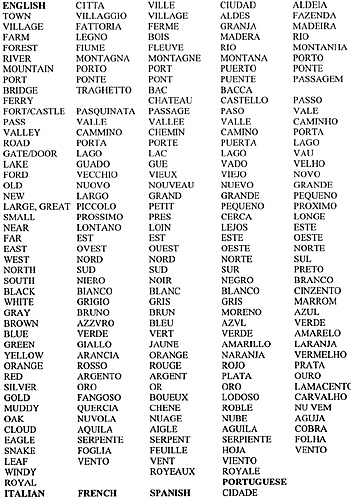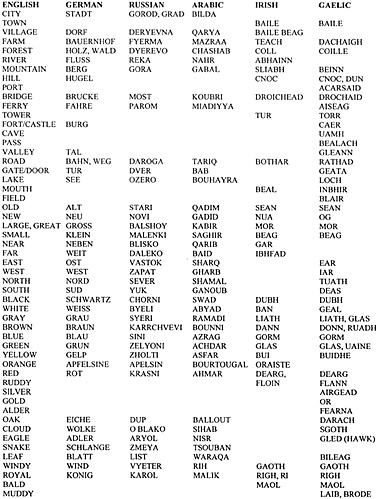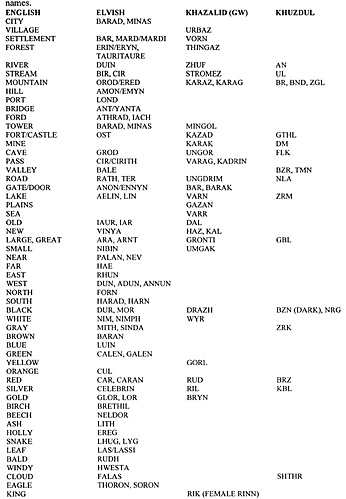In the grand Piepenbrink view of things, wargame terrain described in terms of numbers and letters rates as a serious annoyance. My units are derived from real units with real designations, and even though a battle and battlefield may be generated by a host and not a history book, I can't work up as much enthusiasm for storming the heights of Objective #1, going through Village A house to house and sweeping through the type 1 1/2 woods as for something that has real names.
But how, after all, to name foreign lands? Well, as my scanty vocabulary of "foreign" expanded, and as I looked through the glossaries attached to military maps, I realized that most place names are done on a pretty simple program. You can see the bare bones of it in America where most of the narners spoke English. Leaving Native American place names out of the picture, and forgetting names transplanted from Europe, the principle becomes pretty clear; either (1) it's my city, and I want everyone to know it - Gettysburg PA, McAllister OK, Fort Wayne IN, or (2) that's what it looks like to me, or that's what it is - Snake (or Eel) River, Red River, Big River (Rio Grande) and - a personal favorite - Muddy Boggy River.
Among Mountains we have Bald Eagle Mountain, Smoky Mountain, Blue Ridge Mountain, Pike's Peak... the same basic system that generates town and river names. Nor are things really different overseas. Learn the British (Celtic) names for hill, woods, valley (bree, archet and coomb) and place names in Britain become clearer. Tack on Chester for fort and dinas or dun for hill-forts, with leon for "Legion" and you can see how the weird romantic place names of Britain follow the same basic pattern. New Town (Newton) as an English place name is paralleled by Neuburgs all over Germany, and by Novgorod in Russia, or, for that matter Carthage.
I used to visit the Red Castle (Rothenburg) regularly. Other soldiers were stationed by Two Bridges (Zweibruken or Deuxpontes) or by the Frank's Ford. Wonderfully exotic Vladisvostok turns out to be plain East Port. Hence the Foreign Name Generator. I keep handy dictionaries of exotic languages, and sometimes produce potted summaries of the most common place-name words. Have a city on your table? Well, I liked Rothenburg, but the battle's in France, so welcome to Rougeville or Chateau Rouge, or, switching the action to Russia, Krasnigorod. If I prefered Zweibrucken, we might try Dwamost in some Slavic land, the Polish & Russian being identical. My best tool is Bergman's The Concise Dictionary of 26 Languages, supplemented by one of those consciously multi-ethnic "what to name the baby" books for personal names. This works well for disguised scenarios too, though you do run the risk of a player with a good vocabulary realizing that the Nahr Ahmar expedition will likely resemble the Red River Campaign. Still, I see no objection to giving alert minds a little edge, and I'd hate to bet the rent on the campaign master following the historical scenario exactly.
Ah, but you really wanted a science-fiction or fantasy campaign? As a card-carrying HMGS member I shouldn't, but I'll lend a hand anyway. Ruth S. Noel's The Languages of Middle Earth includes a pretty good Elvish vocabulary, and a (very) little Dwarvish. Best bet for the science fiction fan is Marc Okrand's The Klingon Dictionary.
If that's not satisfactory or sufficient, Dianne Duane and CJ Cherryh have both published science-fiction novels with glossaries of alien languages appended. Neither is as extensive as Noel or Okrand, but you're picking plausible terrain names, not boning up for a language exam. On the negative side, don't bother with Games Workshop's Dwarven and Orkish glossaries. They're too full of jokes and puns to be any practical use.
But you don't want to take the time. You just want to roll dice? OK. Final offer. Attached are quick references to useful words for naming terrain features. Just use them, please. I don't want to fight in defense of Village #3 again, when I could be using Driedorp, Villa Tres or Baile a tri as a battle honor.
Note: The following chart appears slightly misprinted in MW112--the rows in the columns should be shifted down one.--RL

Here is a rather mixed lot of languages. In German and Russian, the adjective precedes the noun, where in Arabic and Celtic the reverse is (mostly) true. The Celts had an immense set of terms for mountains and hills, of which I only give a sample. Remember that Russian and Arabic have no standard transliterations to the Latin Alphabet, and the Celtic tongues notoriously are pronounced differently from their standard spellings. When some variant spelling is accepted as a place name and more or less spelled and pronounced the same, way, I've attempted to use that form.

Fantasy Place Names
The lazy man's source of fantsy languages is JRR Tolkien, and most of the work was already done by Noel. The perfectionist interested in the use of grammatical Sindarin or Quenya should consult the text in full. For the rest of us, I append a short list of nouns and adjectives useful in forming place names.

Beyond the raw vocabulary, note that "Elvish" languages all place adjectives after the nouns, as do romance languages, and that plural forms in Quenya add an "i" to words ending in a consonent and a "r" to words ending in a vowel. Sindarin plurals involve changing vowels. Alas, Tolkien did not always make clear which of the related Elvish languages a given word was. Known plurals are given following a slash as hill/hills or amonlemyn. Prepositions are not used.
Tolkien's Dwarven (Khuzdul) language was never sketched out in such detail, but it is clear that consonants remain constant and plurals of parts of speech are indicated by vowels. I have attempted to supplement the very limited KhuzduI of Noel's work and The Lord of the Rings itself by study of the draft material published as The History of Middle-Earth, and attempted to derive roots by finding known words in a compound word. This is a little iffy as Tolkien tended to pick a word he liked, but to vary the translation. But who can say I'm wrong? Note that Khuzdul, like English and the other Germanic Languages, places adjectives ahead of the nouns they modify. So Black Lake would be Narog-zirim in Khuzdul and Aelin-dur in Elvish.
Games Workshop, treading right to the edge of the Tolkien copyright has their own Dwarven, Khazalid, and if maps, narrative and lexicon are not altogether consistent, it does yield a nice harvest of place names. Note that in Khazalid adjectives follow nouns, and a preposition a meaning of, is used inconsistently. Black Lake here would be Varn Drazh, an actual name on a GW map.
Back to MWAN #112 Table of Contents
Back to MWAN List of Issues
Back to MagWeb Magazine List
© Copyright 2001 Hal Thinglum
This article appears in MagWeb (Magazine Web) on the Internet World Wide Web.
Other military history articles and gaming articles are available at http://www.magweb.com